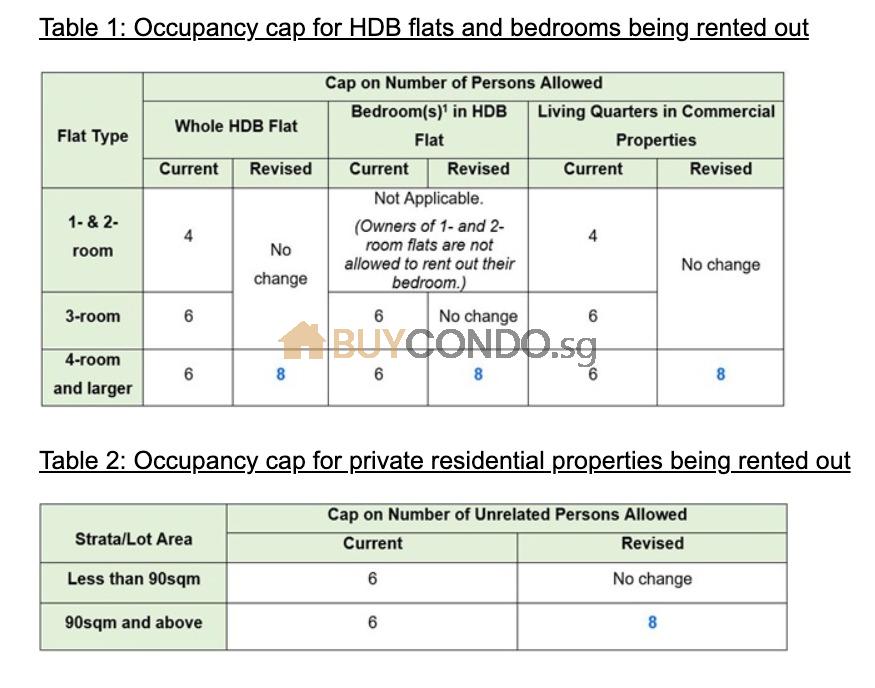
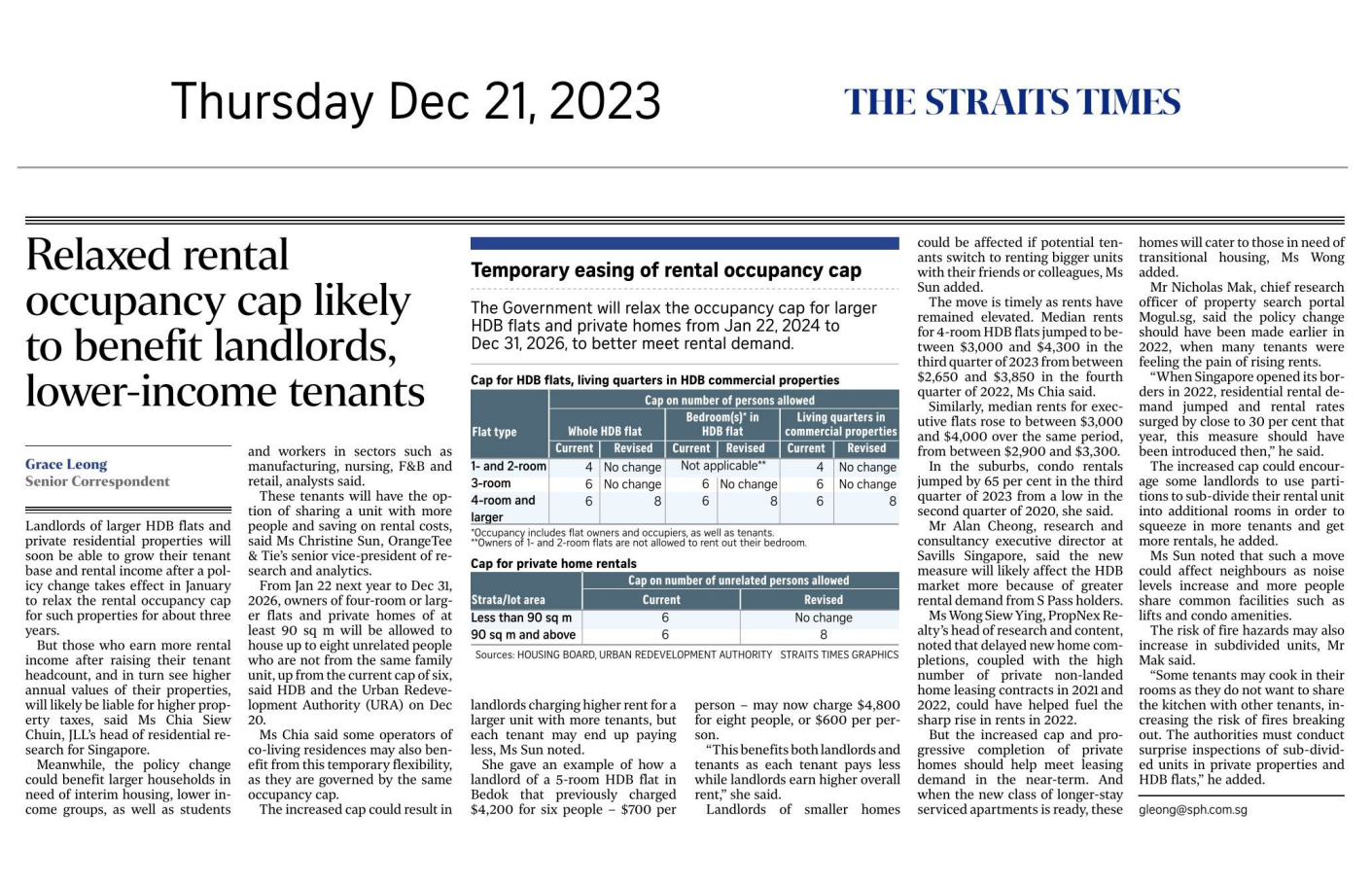
Prior approval/registration required
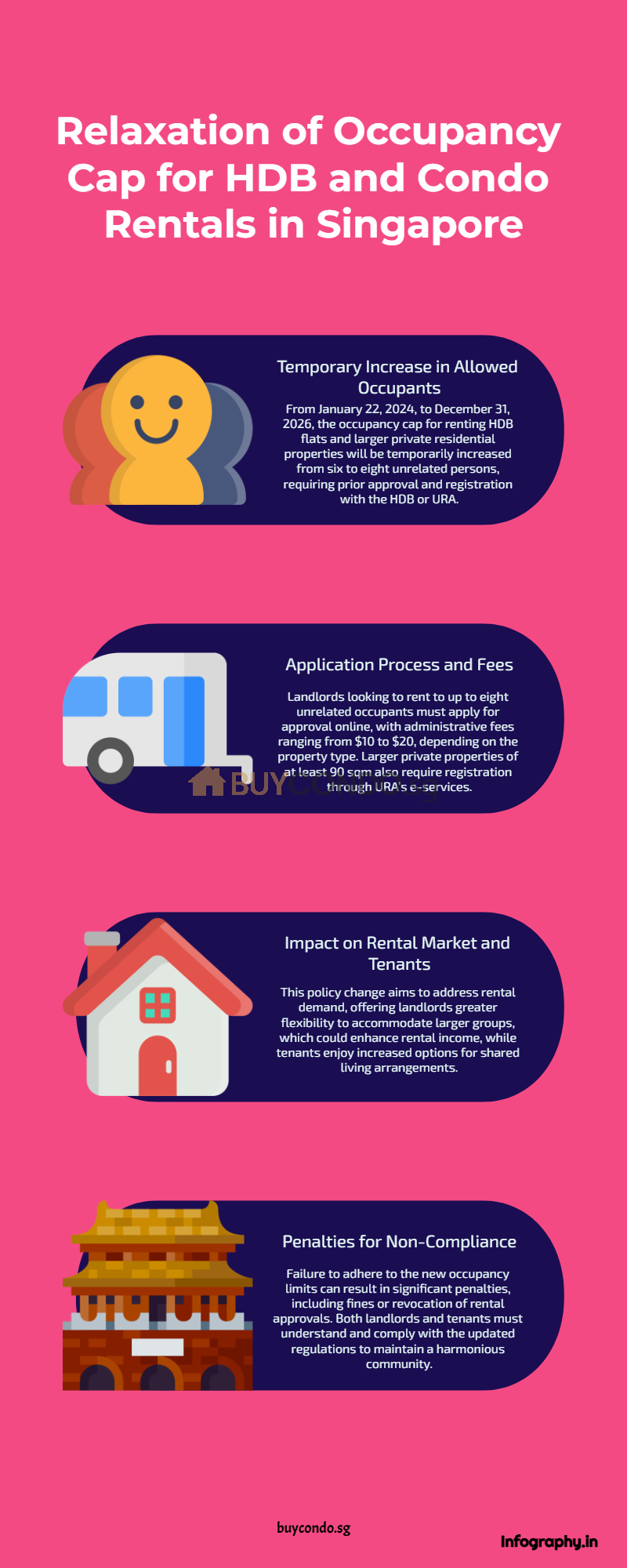
HDB increase occupiers from 6 to 8 pax Steps (Suggestion you can try)
Please go to the efeedback link :
Subject: Living in an HDB Flat
Category: Renting Out of Flat ( From home Owner)
Sub Category: Policy
to inform HDB to give the consent to increase the capacity from 6 to 8 pax.
For landlords who is planning to get a higher rental this will be a good news.
2 of The Properties Under BUYCONDO Property Management Service has already gotten approval.
- Lucky Plaza ( For Coliving Usage)
- Apartment along Daisy Road (For Construction worker, Work Permit Holders)
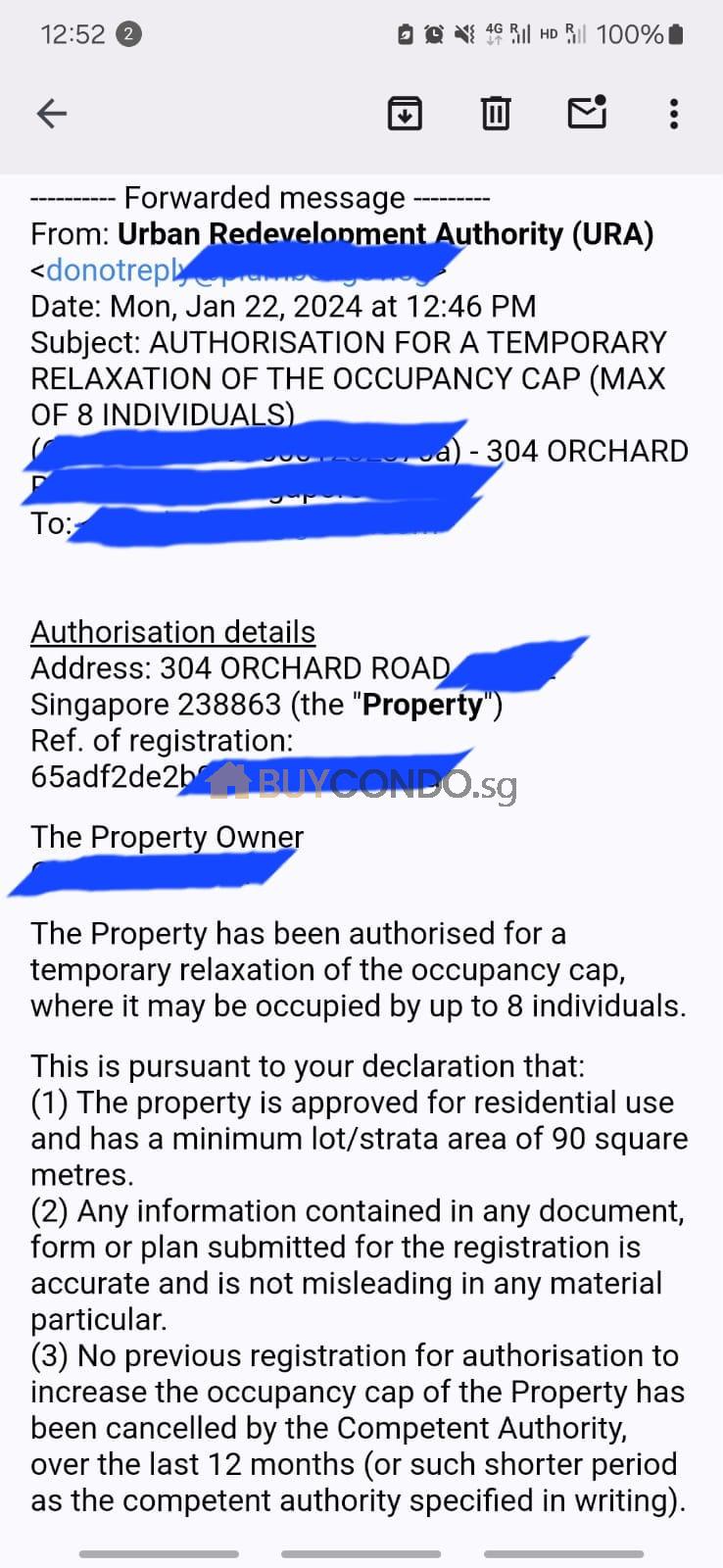
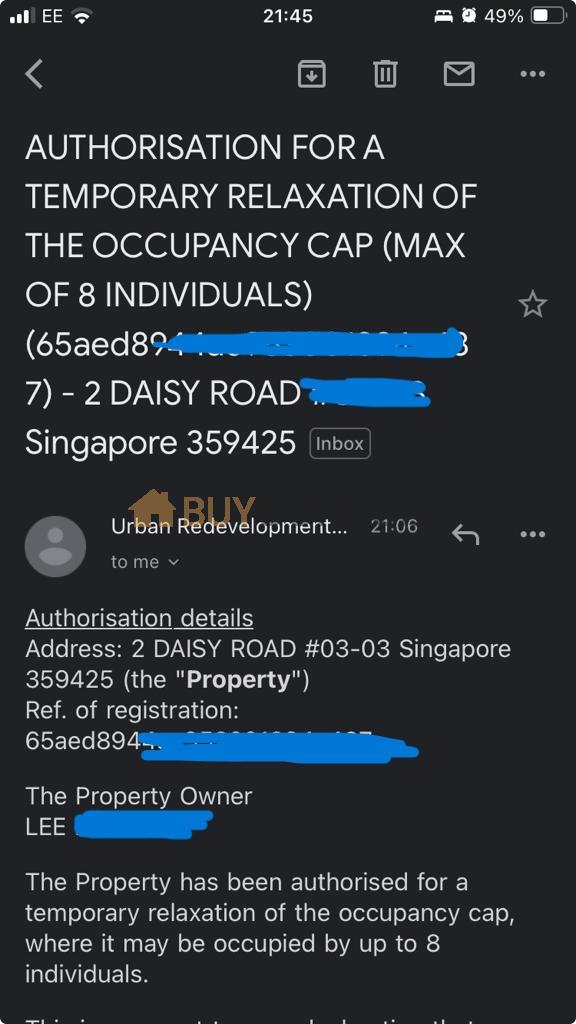
This also comes in handy as I have landlord have just appointed us to rent out their Executive HDB flat which is 147sqm / 1582sqft in Blk 603 Choa Chu Kang Street 62 Singapore 680603.
Which Category of Tenant will benefit from this news for the new
temporary occupancy cap for a period effective 22 January 2024 to 31 December 2026,
Temporary relaxation of occupancy cap Criterias
(a) 4-room and larger HDB flats
(b) Living quarters of HDB commercial properties (where the living quarters are equivalent to or larger than a 4-room flat)
(c) Larger private residential properties of at least 90sqm
For example, a one-bedroom condo may be suitable for a single person or a couple, while a five-bedroom condo can comfortably accommodate a larger family or a group of friends, offering flexibility and choice to prospective tenants.
Moreover, the maximum occupancy limit for condos in Singapore of 90sqm and/or above is set at eight occupants as part of the temporary relaxation of occupancy cap from URA.
Providing tenants with the flexibility to share the space with a larger group of individuals, making it an ideal option for families, roommates, or friends looking to reside together in a single unit. This regulatory framework underscores the importance of understanding the capacity of different condo types and the maximum occupancy regulations for both landlords and tenants in Singapore.
Can Landlords benefit to get your place rented out Faster and Higher Rent?
1) Co-living Operators.
( Condo Landlords looking to rent out, BUYCONDO Team helps to recommend and filter the companies are keen and obtaining good rental rates for landlords. Speak to us to find out more)
2) Co-sharing Foreign Tenants holding on to S-Pass or PR status.
Who are these Groups of Tenants?
This is a vast group of tenant that will be mainly renting HDB whole units. Usually the sharing can be among Friends, Colleagues or relatives or cousins from the same hometown.
Examples of Condos with Big Floor Plates that will Benefit
Etc Tan Tong Meng the sizes offered is 3,240sqft. We are doing property management services for Landlords and the rent was affect due to the reduce cap for each apartment.
How to Apply for Condo Landlord
Owners of larger private residential properties of at least 90sqm who wish to rent out their properties to up to eight unrelated persons are required to register with URA2. They can do so by registering their properties via URA’s e-services. An administrative fee of $20 is payable with each registration. Upon successful registration, the owner will be informed that they can use the residential property to accommodate up to eight unrelated persons, each subject to a minimum stay duration of three consecutive months.
How to Apply for HDB commercial property owners
HDB commercial property owners and tenants who wish to rent out their living quarters can apply via the GoBusiness Licensing Portal. They must pay a S$100 administrative fee when doing so.
How to Apply for HDB Owners
Applications to rent out HDB flats or bedrooms may be submitted online via its e-services, with applicants required to pay an administrative fee of S$10 per bedroom or S$20 per whole flat rented out.
Who are Not Eligble for the New Occupancy Cap?
These new cap is only applicable to the tenancy have have not commenced. Hence if your tenancy has already commenced you are not not automatically eligible. (Based on what is brief on the official website while landlords may want to check if the Official Authorities and take reference to Condo By-laws to make sure there is no infringe.
Maximum Occupancy Limits for Condos
In Singapore, the regulations governing maximum occupancy limits for condos are designed to maintain a safe and comfortable living environment for all residents. Private residential properties are subject to a strict occupancy cap of six unrelated individuals, and it is imperative for both landlords and tenants to ensure compliance with this rule to avoid any potential legal repercussions. For instance, a three-bedroom condo in Singapore, with its designated occupancy limit, underscores the importance of adhering to these regulations to prevent overcrowding and maintain a balanced residential community.
Additionally, the regulations for HDB flats are contingent on the size of the unit, with the maximum occupancy varying based on factors such as the number of rooms and the property’s dimensions. This highlights the need for tenants and landlords to familiarize themselves with these specific guidelines and ensure compliance to avoid any penalties or legal issues. By understanding and abiding by these rules, tenants and landlords can contribute to a harmonious living environment while also preventing any unnecessary financial or legal consequences. Moreover, the careful adherence to these occupancy limits is essential for fostering a balanced and respectful residential community in Singapore.
Future Changes in Occupancy Rule
The anticipated relaxation of the occupancy cap for larger HDB flats and private residential properties from 22 January 2024 represents a significant development with implications for both landlords and tenants. This relaxation is expected to provide greater flexibility in accommodating larger groups or families within these properties, thereby catering to evolving housing needs. For example, a landlord who owns a large private residential property or HDB flat may find the relaxation of the occupancy cap beneficial in attracting tenants, potentially increasing the demand for their rental units. Conversely, a family looking to rent a larger property may find it easier to secure a suitable living space without being constrained by the current occupancy limits.
As this change is poised to take effect in the near future, both landlords and tenants should stay informed about the specific guidelines and regulations that will govern the relaxed occupancy cap. Understanding the updated rules will be crucial for ensuring compliance and making informed decisions when entering into new lease agreements. Therefore, it is essential for all parties involved to stay updated with the latest information on the relaxation of the occupancy rule to make the most of the opportunities it presents. By staying informed and understanding the implications of these changes, landlords and tenants can navigate the evolving rental landscape in Singapore effectively.
Short-Term Accommodation Policies
The prohibition of short-term accommodation in Singapore underscores the emphasis on stable and long-term rental arrangements, ensuring a sense of permanence and stability within residential communities. Properties must be rented out for a minimum of three consecutive months, aligning with the objective of promoting a stable and secure living environment. For instance, if a group of tourists or visitors plans to stay in Singapore for a short period, they must seek alternative accommodation such as hotels or serviced apartments to comply with the rental policies.
Landlords should communicate the minimum rental period to potential tenants and ensure that their rental agreements reflect this requirement. Additionally, tenants should be aware of the minimum rental duration and plan their accommodation needs accordingly. By understanding and adhering to the minimum rental period, both landlords and tenants can contribute to a transparent and compliant rental process, thereby avoiding any legal issues or penalties. This proactive approach fosters a stable and secure residential community, aligning with the broader goal of maintaining a harmonious living environment for all residents.
Renting Condos to Large Groups
When renting condos to large groups in Singapore, it is essential for both landlords and tenants to understand and adhere to the guidelines set forth in the rental regulations. This involves being mindful of the maximum occupancy limits for private residential properties, which currently stand at six unrelated individuals, ensuring that this cap is not surpassed when renting to large groups. For HDB flats, the maximum occupancy varies depending on the size of the unit. It is crucial for landlords to communicate these limits clearly to tenants, and for tenants to abide by them.
Additionally, both parties should consider the potential implications of renting to large groups, such as the increased wear and tear on the property and the heightened possibility of disturbances within the community. Landlords should establish clear agreements with tenants regarding the responsibilities for maintaining the property and managing any communal facilities in the condo. Moreover, tenants should be mindful of their obligations to uphold the terms of the tenancy agreement, including respecting the property and the rights of other residents within the condo. By understanding and following these guidelines, both landlords and tenants can ensure a harmonious renting experience for large groups in Singapore.
Consequences of Violating Rental Policies
Understanding and adhering to the rental policies in Singapore is essential for both landlords and tenants to avoid potential consequences. Failure to comply with these regulations can result in significant penalties, including hefty fines and even the forfeiture of the rented property. For example, if a landlord exceeds the maximum occupancy limit for their condo by allowing more than the specified number of tenants to reside in the property, they could face substantial fines and legal repercussions. Similarly, tenants who sublet the condo to an excessive number of occupants or engage in unauthorized short-term rentals may find themselves in violation of the rental policies, leading to financial liabilities and potential eviction.
It’s important to note that these penalties are not only financially burdensome but can also have long-term implications on the landlord-tenant relationship and the overall rental experience. Therefore, it is in the best interest of all parties involved to carefully adhere to the stipulated rental regulations to avoid any unfavorable outcomes. By understanding and respecting these policies, both landlords and tenants can create a harmonious and legally compliant rental environment, ensuring a positive and sustainable renting experience for all.
Landlords, on the other hand, should be mindful of the maximum occupancy limits for condos in Singapore, which currently stand at six unrelated individuals for private residential properties and vary depending on the size of the unit for HDB flats. It is important for landlords to communicate and enforce these occupancy limits to avoid any violations that could lead to penalties such as fines or loss of property. Additionally, both parties should pay attention to the upcoming relaxation of the occupancy cap for larger HDB flats and private residential properties from 22 January 2024 to stay abreast of the changing regulations.
Therefore, both tenants and landlords should take proactive measures to understand and comply with the existing regulations while staying informed about any future changes in condo rental policies in Singapore. This will contribute to a harmonious and legally sound rental experience for all parties involved.
More details of this change can be found in the joint press release by HDB and URA. For enquiries, please contact:
-
HDB Branch Service Line at 1800-225-5432/e-Feedback form, for HDB flats.
-
HDB Commercial Enquiry Line at 1800-866-3073, for living quarters of HDB commercial properties.
-
URA Development Control Line at 6223-4811/e-Feedback form, for private residential properties.
- Apply for : temporary Relaxation(Condo) of Occupancy Cap (For Private Properties).













